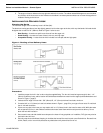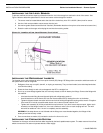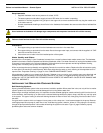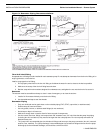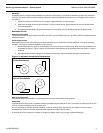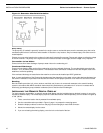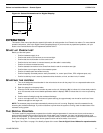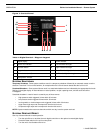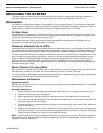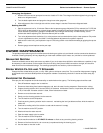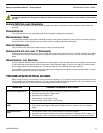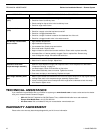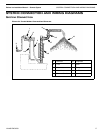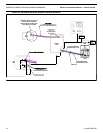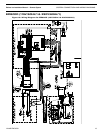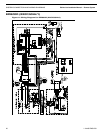
Eskimo Ice Installation Manual - Remote System SERVICING THE SYSTEM
L-2448B ENGLISH 13
SERVICING THE SYSTEM
This section contains information critical to correct servicing of this Dometic ice-making system. Read and understand all
information before beginning. If you have any questions, call the Dometic service department at 804-746-1313.
REFRIGERANT
Your Dometic ice-making system contains R-134a refrigerant, an environmentally safe gas. The unit comes pre-charged with
the right amount of refrigerant for operation and should not need seasonal recharging. If recharging is necessary, R-134a is a
single-component refrigerant and should never be charged in the liquid phase while the unit is running.
R-134A TOOLS
Use a dedicated R-134a gauge set. This system uses common automotive-type quick connects for gauge connections. They
help ensure that only R-134a tools are used. If you need a gauge set to fit the connections, consult your local supply house or
contact your dealer and ask for Dometic part number A-134a.
Care must be taken when using vacuum pumps and recovery equipment with R-134a and other refrigerants. See the
manufacturer's manuals before operating this type of equipment.
CONSTANT PRESSURE VALVE (CPV)
One feature of the CPV is that it is not overly charge-sensitive; the head pressure does not vary with charge. Another good point
is the suction pressure remains fairly stable independent of head pressure, seawater temperature, or ambient temperature. The
downside of this is you cannot charge by pressure, only by superheat or a weighed-in charge which is located on data plate.
The CPV comes set from the factory and should not need resetting in the field. If it does, then only a qualified technician should
do so. Changes in the setting must be made slowly, 1/4 turn per 10 minutes, to allow for settling of the pressures. Correctly
charge the system by the weight indicated on the data plate. Recommended pressure is 6 to 7.5 PSI (6.8 PSI is ideal) as
determined by an accurate gauge capable of reading low-pressures. Misadjustment of the valve can cause reduced ice
production, damage to components, and voiding of the warranty. If under warranty, call for authorization before adjusting CPV,
otherwise warranty will be voided.
QUICK CONNECT FITTINGS (QCS)
QCs can be used in a method similar to base valves. To check compressor suction valve integrity, remove the liquid line QC at
the condensing unit. Within 15-20 minutes, the unit should be pulling a vacuum in the 25-27" HG range.
You can also use QCs to troubleshoot leaks by narrowing down the search to individual parts, such as linesets, condensing unit,
and auger unit. Disconnect the QCs and pressurize all parts separately.
RECHARGING THE SYSTEM
System Shutdown
Optimally, turn the system off 4 to 6 hours prior to servicing to allow refrigerant to reach ambient temperature. This will expedite
the recovery of the refrigerant.
Evacuate Refrigerant
1. Connect the gauge set to both the high and low side ports. Attach the center line of gauge set to the recovery unit.
2. Evacuate system per governing EPA regulations.
3. With the gauge set still connected to both ports, attach the center line of the gauge set to the vacuum pump.
4. Turn on vacuum pump. Open both high and low manifolds and allow the pump to run so the vacuum reaches 28" HG.
Close gauge-set valves and turn off pump.
5. Leave the system for 15 minutes then observe the gauges. If any vacuum has been lost, check for leaks, especially at
any mechanical fittings.
6. Repeat the vacuum process until a vacuum of 200 microns or less is achieved, 50 microns is ideal. If the system was
open to the environment, or was wet as indicated by the sight glass, allow 12 to 24 hours for evacuation. Close gauge-
set valves and turn off pump. If no vacuum is lost, proceed with charging.
NOTE: If moisture was a problem, refer to Refrigeration Bulletin 02-1 for instructions on clean up. This bulletin is available on
the DometicEnviro.com Customer News and Information website under Technical Field Notices 2002: "Control of Moisture in
Refrigeration Systems" (FN#175-I2).



